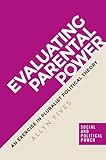Evaluating parental power : an exercise in pluralist political theory / Allyn Fives.
Material type: TextSeries: Publication details: Manchester : Manchester University Press, (c)2017.Description: 1 online resourceContent type:
TextSeries: Publication details: Manchester : Manchester University Press, (c)2017.Description: 1 online resourceContent type: - text
- computer
- online resource
- 9781526118806
- HQ755 .E935 2017
- COPYRIGHT NOT covered - Click this link to request copyright permission: https://lib.ciu.edu/copyright-request-form
| Item type | Current library | Collection | Call number | URL | Status | Date due | Barcode | |
|---|---|---|---|---|---|---|---|---|
 Online Book (LOGIN USING YOUR MY CIU LOGIN AND PASSWORD)
Online Book (LOGIN USING YOUR MY CIU LOGIN AND PASSWORD)
|
G. Allen Fleece Library ONLINE | Non-fiction | HQ755.8 (Browse shelf(Opens below)) | Link to resource | Available | ocn990031784 |
Includes bibliographies and index.
Cover; Evaluating parental power; Contents; List of tables ; Series editor's foreword; Acknowledgements; Introduction: philosophy, power, and parents; Part I: Paternalism and its limits; 1 Paternalism; 2 Caretaker or liberator?; Part II: Conceptual and methodological issues; 3 Moral dilemmas; 4 Children's agency; 5 Parental power; 6 Normative legitimacy; Part III: The moral legitimacy of parental power; 7 Legitimacy in the political domain and in the family; 8 Licensing, monitoring, and training parents; 9 Children and the provision of informed consent.
10 Sharing lives, shaping values, and voluntary civic educationConclusion; References; Index.
When and for what reasons does parents' power have legitimacy? And how do we rationally justify such normative evaluations? These are the questions posed in this book. In doing so, a number of specific case studies are examined in detail and an argument is made for a pluralist approach both to the conceptualisation of power and to its normative evaluation.
COPYRIGHT NOT covered - Click this link to request copyright permission:
There are no comments on this title.
